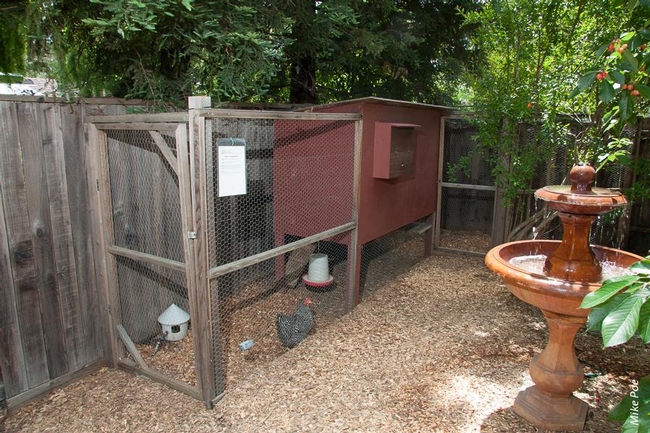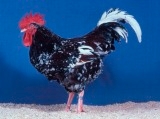
Posts Tagged: backyard chickens
Poultry owners asked to monitor their birds for virulent Newcastle disease
Commercial and backyard poultry owners are asked to be attentive to their animals' health to help prevent the spread of the lethal and contagious virulent Newcastle disease now raging in Southern California, reported Bob Rodriguez in the Fresno Bee.
Symptoms of the disease include sneezing, coughing, green watery diarrhea, neck twisting, paralysis, decreased egg production and swelling around the eyes and neck, according to Maurice Pitesky, UC Cooperative Extension poultry specialist.
He said the popularity of backyard chickens is one of the challenges to controlling the disease. He estimates there are about 100,000 homes with poultry, with each home averaging five chickens.
"That is a lot more than in 2002, when we had the last outbreak (of virulent Newcastle disease)," Pitesky said. In 2002, the disease started in a backyard flock and eventually spread to 22 commercial poultry farms, killing 3.2 million birds.
"While people have the best of intentions, unfortunately a lack of biosecurity practices in people's backyards is one of the contributing factors of the disease spreading," Pitesky said.
Birds can become infected by coming into contact with other birds that are carrying the disease or by humans that carry the disease in their clothes or shoes. Pitesky said the disease also spreads when people purchase birds from a private party who may not be able to verify the bird is disease free.
He recommends buying from a hatchery or feed store that is affiliated with the National Poultry Improvement Plan, an organization that focuses on disease control.
“The goal is to be preventative,” Pitesky said.
If backyard chickens appear ill, owners should call the California Department of Food and Agriculture's State Bird Hotline at (866) 922-2473.
For more information on the disease, see the Virulent Newcastle Disease Outbreak Information and Resources page Pitesky has posted to his website, UC Cooperative Extension Poultry.
Backyard chickens ruling the roost in Bay Area

The story was centered in Hayward, a community that is the latest to deal with local interest in very small-scale poultry husbandry. San Jose, Oakland, Berkeley and San Francisco do not require a permit or fee. Some communities require permits to slaughter animals for food. In Palo Alto, chicken permits are $60.
Parr spoke to UC Agriculture and Natural Resources poultry expert Maurice Pitesky about the growing trend of backyard chicken ownership.
"It's part of a general trend toward local food," said Pitesky, who is a UC ANR Cooperative Extension specialist based at UC Davis. "People read things in the media and feel they might be able to have more control and safer food if they're growing it themselves. It's a growing trend in urban areas, and poultry are relatively easy type of food animal to raise."
The article provided a link to the UC Cooperative Extension Poultry website, which includes information for backyard poultry, small-scale production and commercial production.
Chickens, chickens everywhere

The amount of attention and care that families spend on their chickens shows that chickens are a labor of love, much as any family pet. Every hen I visited on the Tour de Cluck had a name, and each owner assured me that their “girls” all have their own personalities. Some of the chicken coops were woodworking pieces of art.
Chicken stories are showing up in all types of mainstream media. Feature articles have appeared recently in The New Yorker (Susan Orlean’s home chickens), the New York Times (why Americans raise chickens; women in Berkeley who raise chickens); and a book review of raising chickens in the city), and in the CA&ES Outlook alumni magazine where I work at UC Davis – the College of Agricultural and Environmental Sciences (backyard chicken farming, page 10).
Chickens aren’t difficult to manage, but like raising any animal, the prospective chicken owner should know what he or she is taking on, and should be a responsible animal owner. While it may be fun to muse over the fancy breeds, or to salivate over the thought of fresh omelets each day, it’s important to learn about housing, nutrition, health, local ordinances (which may limit the number of hens and/or the ability to keep roosters), and other pertinent topics.
Where to get information?
- Bookstore shelves are awash with chicken-raising books. Check your local bookstore or online book source. There are even chicken-raising books in the “idiot’s” and “dummies” series (The Complete Idiot’s Guide to Raising Chickens; Raising Chickens for Dummies; and Building Chicken Coops for Dummies).
- Sunset magazine has a useful list of books on raising chickens
- Sunset magazine also has a free download on how to raise chickens
- Backyard Poultry is a popular bimonthly magazine with special topics each month (breeds, health, nutrition, etc.).
- Your local Cooperative Extension or 4-H office should be able to match you up with chicken-raising resources. Here are two University of California sites with information on raising chickens: UC Davis Poultry Page, and ANR publications.
Whatever your reason for raising chickens — and the reasons are many — do your homework first and make sure you get the proper supplies and the breeds that will give you years of pleasure . . . and fresh eggs.

